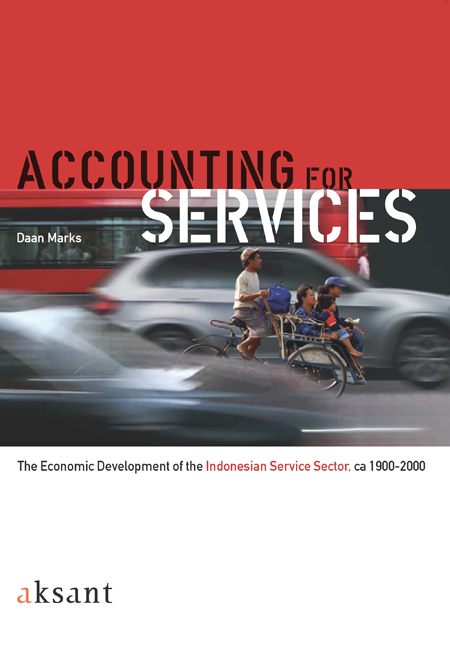Book contents
- Frontmatter
- Contents
- List of Tabels
- Acknowledgement
- 1 Introduction
- 2 National Accounting for Services in Indonesia
- 3 The Development of the Indonesian Service Sector: A Quantitative Analysis
- 4 Roads to Riches? Transportation and Economic Development in Indonesia
- 5 Involution and Growth: the Ambiguous Role of the Trade Sector in the Economic Development of Indonesia
- 6 Unity or Diversity?: Market Integration through Trade and Transport
- 7 Conclusions
- Appendices
- References
4 - Roads to Riches? Transportation and Economic Development in Indonesia
Published online by Cambridge University Press: 19 January 2021
- Frontmatter
- Contents
- List of Tabels
- Acknowledgement
- 1 Introduction
- 2 National Accounting for Services in Indonesia
- 3 The Development of the Indonesian Service Sector: A Quantitative Analysis
- 4 Roads to Riches? Transportation and Economic Development in Indonesia
- 5 Involution and Growth: the Ambiguous Role of the Trade Sector in the Economic Development of Indonesia
- 6 Unity or Diversity?: Market Integration through Trade and Transport
- 7 Conclusions
- Appendices
- References
Summary
INTRODUCTION
The thousands of islands, often separated by vast distances, that comprise the Indonesian archipelago stretch out over approximately 5,000 kilometres from west to east and almost 2,000 kilometres from north to south. The land area of the country, approximately 1.9 million square kilometres, is spread over more than 13,000 islands. Such a geographical setting requires an efficient transportation network for both political and economic reasons.
From a national accounting perspective, the transportation sector usually shows only small variations over time in the contribution to GDP. Krantz (2000) notes that the needs of transport as expressed in economic terms have been relatively constant during both the industrialisation and the modernisation processes. As we saw in the previous chapter, this pattern also holds for Indonesia where the contribution of transport to GDP varies between 2 and 7 per cent. However, this does not mean that no major changes have occurred. On the contrary, some modes of transport have more or less disappeared while others have grown significantly in importance.
Another important point that needs to be stressed is that contribution to GDP is not always the best measure on which to assess the importance of an economic sector. In the case of transportation it can be argued that an efficient transport infrastructure is a necessary but not sufficient condition for economic growth. As transportation and development expert Wilfred Owen states:
‘Many factors contribute to economic and social progress, but mobility is especially important because the ingredients of a satisfactory life, from food and health to education and employment, are generally available only if there is adequate means of moving people, goods and ideas.’ (Owen 1987: xi)
In the extreme case of no transportation network at all (or infinite transportation costs), local specialisation is impossible and autarky is the only possible economic outcome. If this assumption of infinite transportation costs is loosened it can be shown that transportation developments can be a catalyst for economic growth.
Owen (1964, 1987) has shown that many developing countries lack year-round mechanised transport. Movement in these countries is often still by unreliable, high-cost, labour-intensive methods. On the other hand, in advanced economies transportation has developed rapidly with the advent of cheap, mass air travel, high and rapidly rising levels of personal mobility based on car ownership, and containerisation of general freight.
- Type
- Chapter
- Information
- Accounting for ServicesThe Economic Development of the Indonesian Service Sector, ca 1900–2000, pp. 91 - 130Publisher: Amsterdam University PressPrint publication year: 2009



